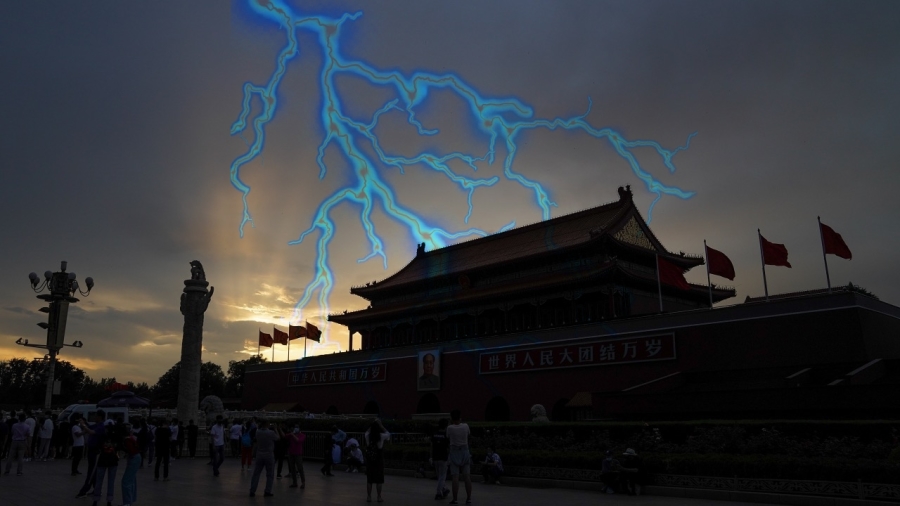Listen to the article
Xi’s Iron Grip Weakens as Chinese Communist Party Shows Signs of Internal Fracture
The recently concluded Fourth Plenary Session of the 20th Chinese Communist Party (CCP) Central Committee maintained an appearance of continuity, with Xi Jinping retaining his three key titles—Party General Secretary, State President, and Chairman of the Central Military Commission (CMC). But beneath this veneer of stability, political observers have identified significant shifts that suggest Xi’s once-unchallenged authority may be eroding.
The most telling indicator of Xi’s diminishing control appears in recent military appointments, particularly the elevation of Zhang Shengmin to Vice Chairman of the CMC. This positioning—with Zhang Youxia to Xi’s left and Zhang Shengmin to his right—symbolically isolates Xi at the center of power.
“Under normal circumstances, Xi would have fought tooth and nail to block Zhang Shengmin’s promotion,” noted veteran media analyst Wang Jian. “The fact that he failed means the forces behind Zhang Shengmin are now more powerful than Xi himself. This marks a serious weakening of Xi’s control over personnel decisions.”
The decline in Xi’s personnel influence reportedly began last year. His once-formidable network within military and diplomatic circles has significantly weakened, with nine generals recently falling in corruption probes. This purge effectively eliminated the presence of the 31st Army Group—a key source of Xi’s military support—from senior leadership positions.
“Xi failed to protect Miao Hua and He Weidong, his key allies in the military,” Wang explained. “Once his control over the military cracked, the entire foundation of his power collapsed.”
Zhang Shengmin’s role as head of the CMC’s Discipline Inspection Commission positioned him to investigate generals loyal to Xi, reportedly with Zhang Youxia’s backing. Now, with both in leadership positions, they form a counterweight to Xi’s authority within the military establishment.
Analysts suggest Xi’s acceptance of this arrangement represents a strategic compromise to maintain the appearance of unity and prevent an institutional crisis. This suggests a leader more concerned with preserving stability than exercising absolute control—a significant shift from previous years.
The diplomatic sphere has shown similar cracks in Xi’s authority. The abrupt downfall of Qin Gang, Xi’s protégé and former foreign minister, represented a significant blow. “Xi failed to protect Qin Gang—and by extension, failed to protect his own image,” Wang observed. Another rising diplomat, Liu Jianchao, who advanced under Xi’s patronage, has also reportedly been sidelined.
Perhaps most telling is the removal of Zhong Shaojun, Xi’s longtime military aide who served as his personal secretary during Xi’s early years in Zhejiang province. Zhong, who later became Director of the CMC General Office, was quietly reassigned in 2024 to the National Defense University.
Remarkably, the Chinese public first learned of Zhong’s replacement not through domestic media but via an announcement from the Chinese Embassy in North Korea, which mentioned Lieutenant General Xia Zhihui as the new Political Commissar of the National Defense University. This unusual communication channel—bypassing China’s tightly controlled domestic propaganda system—has raised eyebrows among China watchers.
U.S.-based commentator Chen Pokong noted: “All three of Xi’s top military secretaries—Qin Shengxiang, Zhong Shaojun, and Fang Yongxiang—are gone. Add to that the purge of generals Xi personally promoted, and his military influence has collapsed. His inner circle is dismantled.”
When state news agency Xinhua republished the embassy’s report, references to Xia Zhihui’s new title and Zhong Shaojun’s absence were deleted—a censorship move that commentator Jiang Feng said reveals internal contradictions within China’s propaganda system.
“The Chinese Embassy in Pyongyang—technically under the Foreign Ministry—just fired the first shot of defiance against the Party’s unified narrative,” Jiang said. “That means Beijing’s messaging chain of command is no longer unified. That’s the real story.”
This apparent fragmentation within the propaganda apparatus, long considered China’s most cohesive control mechanism, represents perhaps the most significant evidence of Xi’s eroding authority.
Wang Jian describes China’s current political landscape as “stable at the top, fractured in the middle, chaotic at the base.” While Xi maintains his formal titles, his practical ability to direct the Party machinery appears increasingly constrained.
Former Central Party School professor Cai Xia suggested that Xi’s reported health issues during the Third Plenum created an opening for Zhang Youxia to expand his influence and secure disciplinary actions against generals loyal to Xi. By the time the Fourth Plenum convened, key decisions had already been made.
The resulting power arrangement represents what Cai calls a “balance of terror,” with neither faction able to fully dominate. “Both sides are forced to coexist, each fearing the other’s collapse would drag the system down.”
As Xi’s re-election prospects remain uncertain, this rebalancing of power appears poised to define the next chapter of Chinese politics—one characterized less by absolute rule and more by the complex negotiations of competing factions within the Party elite.
Fact Checker
Verify the accuracy of this article using The Disinformation Commission analysis and real-time sources.



